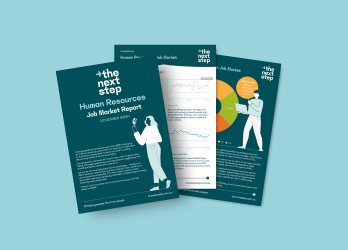AI brings hidden talent into focus
The future of talent management isn't just about finding new hires – it's about discovering and nurturing the hidden potential within your organisation. At a recent panel discussion co-hosted by The Next Step and AHRI, industry leaders shared insights into how AI is transforming internal mobility and challenging traditional recruitment assumptions.

Why AI is revolutionising internal mobility
With Australia's unemployment rate hovering near historic lows and skills shortages persisting across industries, organisations are looking at their talent challenges through a new lens. While many focus their search externally, progressive companies are discovering that their best candidates might already be on the payroll – they're just out of focus.
This shift aligns with broader workplace transformations. The rise of skills-based hiring, coupled with increasingly agile ways of working, has created new opportunities for internal mobility. Yet many organisations struggle to identify transferable skills and match existing talent to emerging roles.
Artificial Intelligence is changing this by bringing hidden talent pools into sharper focus. By analysing wider and deeper pools of employee data – from formal qualifications to informal skills and interests – AI can illuminate unexpected matches between people and opportunities. This capability isn't just improving talent deployment; it's enhancing retention, accelerating career development, and importantly, helping to overcome unconscious biases and other blind spots that often obscure advancement decisions.
Beyond the traditional CV
The next time you fill a role it might not be through a job ad. Your person might not be looking, or might be hiding in plain sight… just a few desks away or in an interstate or overseas office. They simply haven't raised their hand, or their potential has been overlooked by traditional talent searches.
"We've identified amazing candidates for roles that we never would have considered in the past," shared Michael Kim, Head of HR at Spotify at a recent panel discussion at The Next Step offices in Sydney.
Spotify’s custom-built Internal Talent Marketplace, Echo, looks beyond conventional CV data to create rich talent profiles that capture employees' hobbies, passions, and self-declared goals. It is helping to democratise internal recruitment, go beyond traditional growth opportunities and enables global talent matching.
The impact of AI-powered matching technology is tangible. "We proactively tap people for jobs they haven't even applied for," Kim explains. "It's just like Spotify's music recommendations, but for careers."
The power of unbiased matching
When Spotify experimented with AI-powered screening tools several years ago that removed non-pertinent information like
names, addresses and institutions, focusing solely on accomplishments and skill sets, they saw a significant increase in female and diverse candidates. "That validates how powerful unconscious bias is" Kim noted. One notable change, was a significant increase in female engineers after implementing these tools.
These tools aren't just removing bias – they're bringing previously overlooked talent into sharp focus. Angela Lewis adds that organisations are increasingly using AI to identify skills that can be redeployed within the workforce. "Tools like Reejig[AL1] look at matching skills of employees in existing domains with opportunities in new areas. It's about finding where these skills meet and how we can retain our people who might be impacted by AI through redeployment."
Governance and trust are paramount
While Angela Lewis, Executive Transition Lead at Suncorp, has seen incredible benefits of introducing AI into the HR function, she recommends taking a measured approach. "Your governance mechanisms – what data you're using, how it's being used and how you're training your tools with it – are crucial," she highlights.
For those about to begin their AI adoption journey, Lewis suggests the Australian Government's National Artificial Intelligence Centre is a good starting point. She also stresses the importance of "working collaboratively and maintaining regular reviews of your AI systems. Be particularly careful with identifiable information and ensure you have clear use cases for your data."
Data-informed, not data-driven
While Artificial Intelligence excels at processing vast amounts of data and identifying patterns, successful organisations use it to enhance rather than replace human decision-making. "In HR, we have an incredible responsibility because it will have impact on people's lives. You have to use AI in HR to be more human," Kim emphasised. "Never be data-driven, be data informed."
He illustrates this with an example: "Poor performance data on its own tells one story, but add human elements like personal circumstances or trauma, and you might make a very different decision. If you want to retain and grow your people, AI can't do that for you."
Starting your AI journey
- Clean your data: Before
getting started with AI in HR, ensure your employee data is accurate and comprehensive. As Michael Kim notes, "The first part of AI isn't sexy at all. Our team chased down information, identifying gaps because we refused to plug in anything other than rich, accurate data."
- Build trust through transparency: Communicate regularly about how you're using AI, when you're using it, and what you're using it for. This helps address workforce fears and builds confidence in the system. "There's an automatic assumption that AI will lead to productivity improvements," notes
AHRI Research and Advocacy Specialist Gerwyn Davies. "But it won't, unless HR plays a critical role in both upskilling the workforce systematically and ensuring employees are empowered and feel consulted with, so they don't fear AI."
- Maintain human oversight: Always have diverse groups review AI recommendations to spot potential biases and ensure decisions align with your organisation's values and goals. Regular spot checks are essential - look at who you're hiring, how they're performing, and whether you're achieving true diversity in outcomes. As Lewis notes when considering
enabling AI transformation, "You have to constantly check yourself and think about what bias you're building into the system."
- Embrace HR’s important role in leading workforces, building capability and supporting readiness for significant AI transformation.
The role of specialist recruiters
While AI is transforming internal mobility, partnering with specialist HR recruiters remains valuable. Merridy Thomas, Director at The Next Step, emphasises that the key to success in an AI-enabled world lies in "curiosity to use AI to inform, but not replace, human decision-making." She notes that with technology moving so rapidly, change management capabilities are becoming critical, as are the human skills needed for face-to-face interactions and leadership.
"The real value comes from helping organisations navigate this transition," Thomas explains. "It's about identifying where there are inefficiencies, creating opportunities, and most importantly, ensuring the human element remains central to talent decisions."
The Next Step’s specialist recruiters can help:
· Validate AI-driven insights with market intelligence
· Provide complementary external talent mapping
· Share best practices from organisations successfully implementing AI tools within HR functions
· Provide consultants and staff specialised in change management during AI implementation
· Find the right people to foster human-centered approaches to talent management
Embracing the future
As AI technology evolves, it's becoming an increasingly powerful lens for bringing hidden talent into focus. But success depends on getting the human elements right - from governance and transparency to employee consultation and upskilling.
Remember, the goal isn't to replace human decision-making but to enhance it. In Kim's words, "If you want to retain and grow your people, AI can't do that for you. We use it as a way to access more data quickly to make human decisions."
TIP! If you enjoyed reading this article, you might also like to read
AI in HR: Insights from Industry Leadersand Angela Lewis' article
Embracing AI in HR: 7 Top Tips to Enable Transformation Success.
Looking for a new role? Search HR jobs
Need help filling a position? Contact Us
Other articles you might be interested in
Let’s connect
SYDNEY
THe Commons, LEVEL 4
388 George Street
Sydney NSW 2000
GADIGAL land
MELBOURNE
LEVEL 1, SUITE 3
500 BOURKE ST
MELBOURNE VIC 3000
EASTERN KULIN LAND
BRISBANE
Level 14
241 Adelaide st
Brisbane QLD 4000
YUGGERA LAND
The Next Step acknowledges and pays respect to the Traditional Custodians of the lands on which we work.
© THE NEXT STEP 2025



